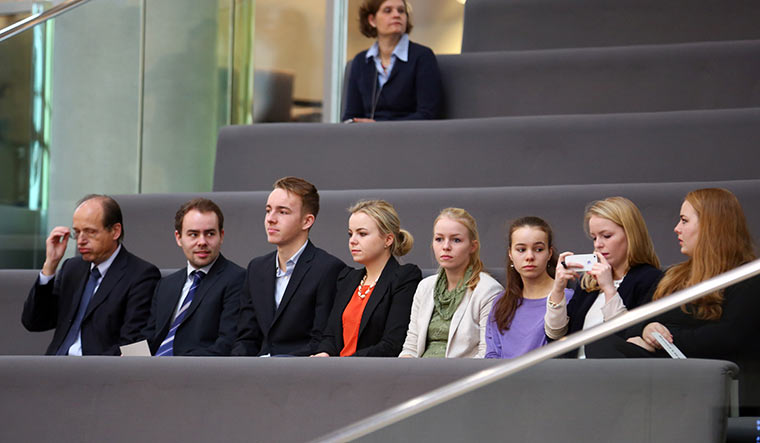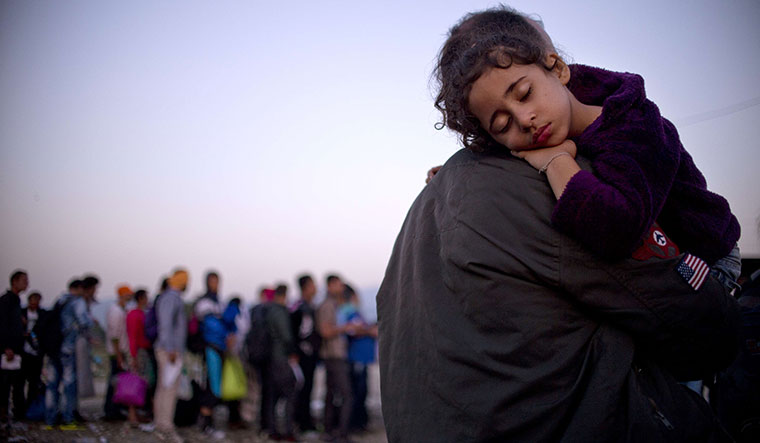SUPERMOM WITH SEVEN children, she is slim, smart and stylish. She bakes cookies and inspects submarines with equal ease. A life-long high achiever who ran powerful German ministries, Ursula von der Leyen, 61, earned nicknames ranging from crèche mama to shotgun girl. As the incoming president of the European Commission—the executive branch of the European Union (EU)—she is now one of the two most powerful women in Europe. The other is her mentor, German Chancellor Angela Merkel. A powerful, bold, green and cohesive “United States of Europe” is what she wants. She says: “If we close the gaps between us, we can turn today’s challenges into tomorrow’s opportunities and emerge stronger as a Union.”
But, she is off to a shaky start. Unlike the US, Europe is represented by a splintered European parliament full of squabbling conservatives, socialists, greens, liberals, populists and extreme left and right parties. A last-minute dark horse from the ruling German centre-right Christian Democratic Union party, von der Leyen won her job with a meagre margin of nine votes. Unlike her predecessors who secured parliamentary approval for legislation by brokering grand coalitions, von der Leyen is hamstrung by her weak majority in a fractious, fragmented house. Besides, all her predecessors were heads of government, experienced in cutting deals and unifying factions. German socialists say von der Leyen is “inadequate and unsuitable” for the high office. But her biographer Daniel Goffart observes: “She is used to being underestimated as a woman, but has beaten men throughout her political career.”
Initial omens bode ill. She failed to assemble a team in time because the European Parliament rejected some of the questionable choices forced upon her. One was a tainted protégé of French President Emmanuel Macron, who had actually masterminded her elevation. Now Macron is furious with her. Unable to hire 50 per cent women in the EC as promised, von der Leyen desperately reached out even to the EU-leaving British Prime Minister Boris Johnson to suggest female candidates. Her green deal for making the continent carbon neutral by 2050 is contested, her aim to fast-track foreign policy decisions by dropping consensus is unrealistic and her desire for more capital-markets integration is controversial. Predicts EU expert Agata Gostynska-Jakubowska: “Her biggest challenge will be to show she can be assertive vis-a-vis the member-states.”
Von der Leyen renamed the title for migration ministry as “protecting our European way of life” to address the resentment against Muslim immigration to Europe. Her rebranding provoked a firestorm of protests from liberals and leftists who described it as appeasing far-right groups.
She is the first German in 50 years to become EC president. Though her start is marred by delays and hiccups, von der Leyen has made shrewd top appointments. Her three high-caliber “executive vice-presidents” symbolise her priorities. The Danish dynamo, Margrethe Vestager, is tasked with making Europe “fit for the digital age”. Vestager will continue as the trailblazing anti-monopoly EU commissioner—a role in which she made an enemy out of Donald Trump by forcing Apple, Google and Facebook to pay millions in taxes and fines. An anti-trust investigation into Amazon’s use of client data is already under way and a new inquiry into Facebook’s proposed digital currency, Libra, is being considered.
The Dutch diplomat Frans Timmermans will be in charge of Europe’s “green deal”. Both Vestager and Timmermans were von der Leyen’s rivals for the EC presidency. Former Latvian prime minister Valdis Dombrovskis will manage economic and financial affairs. He will have a special focus on including the left-behind groups and the small peripheral European nations that resent their second-class status.
Opposing Macron, von der Leyen advocates expanding EU to include the Balkan states. She cites three compelling reasons: they have fulfilled all EU pre-membership demands; these border countries are buffers against migrant inflows; and if EU does not absorb them, they will become the playgrounds of Russia, China, Turkey and Saudi Arabia. In her geopolitical vision, the United States and China are Europe’s competitors. She wants to checkmate American digital hegemony and the Chinese acquisition of European business in strategic sectors.
She began her German ministerial career as a trailblazer, but ended as an imploding star, plummeting to become one of the least popular ministers in Merkel’s cabinet. In 2013, Merkel appointed von der Leyen as the first woman defence minister. The defence ministry did not bury her career. But it buried her ambition to succeed Merkel.
When neo-Nazi cells were discovered in the Bundeswehr (German military), she alienated generals and soldiers by accusing them of “weak leadership” and an “attitude problem”. Under her tenure, the German military continued to battle with unfit submarines, grounded jets and misfiring rifles. She was embroiled in scandals involving cost overruns and grant of lucrative contracts to external consultants like Accenture and McKinsey. The German parliament is investigating the allegations, and von der Leyen faces the ignominy of attending hearings in Berlin as EC president.
But, unlike her predecessors, von der Leyen survived the full six years as defence minister, and repeatedly exhibited the feistiness she showed from 2005 when she first became family and then labour minister. Unlike the consensus-seeking Merkel, von der Leyen is unafraid to push controversial policies. She fought internet porn and advocated minimum wages and boardroom quotas for women. To get women back into the workforce, she introduced crèche facilities and parental leave for fathers.
Von der Leyen balances her strong work ethic and equally strong family values. She flies away to spend weekends with her physician-husband and grown-up children in their genteel country estate near Hanover. Von der Leyen comes from an aristocratic, conservative Christian family and follows in the footsteps of both parents—her powerful politician father and devout mother—who too bore seven children. She was born in Brussels where her father was then posted as a European bureaucrat, and graduated from the prestigious Uccle school, two years senior to Boris Johnson. The posh and petite supermom studied economics, then medicine, had children and finally entered the world of dour, disapproving male politicians.
But even some women were irritated by her best-in-class persona, telegenic smile and picture-perfect coiffed hairstyle. She prefers to hold meetings standing. She loves horse riding, a symbol of her privileged, elitist upbringing. She had a flair for photo ops, posing dramatically against military equipment or wearing outsized red boxing gloves to showcase her battle against domestic violence. Says Goffart, if she has a flaw it is “excessive stage management”.
Her new stage comes with all the traps and trappings of power. The last five years have been tumultuous for Europe, battered by terrorism, trade disputes, conflicts in the neighbourhood, Brexit, Greek debt and migrant inflows. Reconciling polar opposite views on these contentious issues will be tough.
Von der Leyen’s failure to become Merkel’s successor is attributed to her lack of power and leverage within the party. She will not succeed now unless she develops critical allies and power blocs within the EC structure. Externally, gloomy economic forecasts and sharp divisions among EU governments on different issues suggest that while von der Leyen’s ambitions are grand, her achievements could well be modest.




